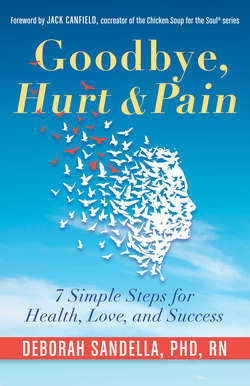Читать книгу Goodbye, Hurt & Pain - Deborah Sandella - Страница 10
На сайте Литреса книга снята с продажи.
DYNAMICS BETWEEN FEELINGS, THE BODY, AND IMAGINATION
ОглавлениеSince the dawn of human time, we have been scared of undesirable feelings. The story of Adam and Eve demonstrates how acting on one's feelings leads to dangerous outcomes. Socrates and Aristotle wrote revered philosophy on how we should cultivate an independent personality, never lowering ourselves to the emotions of anger and lust. Somewhere along the way, we came to think that our feelings were in need of policing to assure our acceptance as virtuous people.
We don't like negative feelings because they are emotionally and physically uncomfortable. This instinct isn't wrong. Recent research shows negative feelings that become chronic can impact our health. Susan Everson-Rose, an associate professor of medicine at the University of Minnesota, along with her associates, found that depression raised the risk of stroke or ministroke by 86 percent, chronic stress increased it 59 percent, while hostility doubled the risk. These findings for the 7,000 adults ages 45–84 in the study remained constant over eight and a half years even when age, race, sex, health behaviors, and other known risk factors were taken into account. At the start, none of the subjects had experienced a stroke or ministroke. The authors conclude that if we want to prevent strokes, we need to pay attention to stress and emotions and how they affect us.2
Similarly, Emory University researchers reviewed 3,200 coronary angiography patients and found that women under fifty-five with depression had twice the risk of dying from a heart condition or experiencing a heart attack.3
The American Institute of Stress, which reviews stress research, estimates that stress-related and stress-induced illnesses account for 75–90% of the one-billion visits Americans make to the doctor annually.4 And Madhu Kalia from Thomas Jefferson University suggests that disabilities caused by stress are just as great as the disabilities caused by workplace accidents or other common medical conditions such as hypertension, diabetes, and arthritis.5
What are we to do? Feelings have a spontaneous life of their own, and if painful ones become chronic, they cause emotional and physical suffering and harm.
In 1995, Daniel Goleman's groundbreaking book Emotional Intelligence, Why It Can Matter More than IQ established the radical importance of emotions. He showed how feeling frequently trumps thinking as an automatic response to life. This bias develops because the emotional brain existed long before the rational brain, “which gives evolved emotional centers immense power to influence the functioning of the rest of the brain—including its centers for thought.”6 Furthermore, the emotional part of the brain learns in a different way from the logical part.
Success or failure in your work and relationships is dependent on how you manage your feelings. The trouble is, precious few of us stop to think about what we're feeling. Our attention is drawn instead to activity around us while our unnoticed inner state initiates most of our behavior. In other words, our reflexive reactions are largely motivated by feelings to which we pay little attention. This is not a recipe for success.
If I were to ask you, “What are you feeling right now?” would you know? Unless you're in the middle of an emotional event, chances are your answer would be, “I have no idea.” Roget's Thesaurus includes more than 3,000 words related to emotion, yet most of us are intimidated by our personal psychology because it's invisible and uncontrollable. So, we avoid thinking about how we feel, while at the same time, we can't stop thinking about how we feel. That's quite an interesting paradox.
So how do we begin to bring our feelings into our conscious awareness? And then how do we allow them to evaporate? You're holding the answer in your hands.
